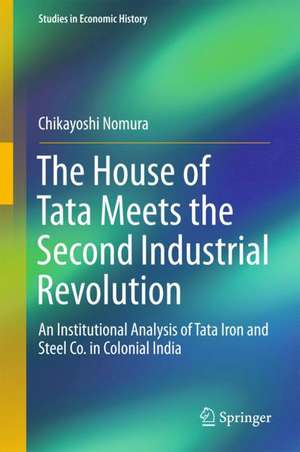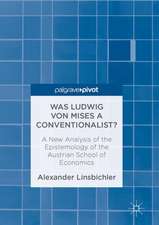The House of Tata Meets the Second Industrial Revolution: An Institutional Analysis of Tata Iron and Steel Co. in Colonial India: Studies in Economic History
Autor Chikayoshi Nomuraen Limba Engleză Hardback – 23 apr 2018
One of the driving forces of India’s high growth rate since the 1980s is the expansion of modern business corporations whose origins date back to the colonial era in the mid-nineteenth century. This monograph explores the historical foundation of the growth of such corporations in colonial India, guided by a substantial collection of documents of Tata Iron and Steel Company, whose rich records have not received the due attention they have long deserved. As clarified by numerous economic and business historians of leading industrialized countries since the works of Douglass North and Alfred Chandler, this study as well proposes that the development of modern business corporations in colonial India was broadly supported by the reciprocal evolution of economic institutions and corporate organizations. Adding a new perspective to the business and economic history of colonial India, the analysis also provides an important case study of the development of corporate business in the non-Western world to the study of global business history.
| Toate formatele și edițiile | Preț | Express |
|---|---|---|
| Paperback (1) | 994.37 lei 6-8 săpt. | |
| Springer Nature Singapore – 25 dec 2018 | 994.37 lei 6-8 săpt. | |
| Hardback (1) | 1000.36 lei 6-8 săpt. | |
| Springer Nature Singapore – 23 apr 2018 | 1000.36 lei 6-8 săpt. |
Din seria Studies in Economic History
-
 Preț: 480.14 lei
Preț: 480.14 lei -
 Preț: 491.86 lei
Preț: 491.86 lei -
 Preț: 495.94 lei
Preț: 495.94 lei -
 Preț: 492.45 lei
Preț: 492.45 lei -
 Preț: 491.31 lei
Preț: 491.31 lei -
 Preț: 483.20 lei
Preț: 483.20 lei -
 Preț: 488.42 lei
Preț: 488.42 lei -
 Preț: 481.68 lei
Preț: 481.68 lei -
 Preț: 485.32 lei
Preț: 485.32 lei -
 Preț: 487.61 lei
Preț: 487.61 lei -
 Preț: 501.71 lei
Preț: 501.71 lei -
 Preț: 499.58 lei
Preț: 499.58 lei - 18%
 Preț: 731.10 lei
Preț: 731.10 lei - 18%
 Preț: 998.82 lei
Preț: 998.82 lei - 18%
 Preț: 722.12 lei
Preț: 722.12 lei -
 Preț: 386.99 lei
Preț: 386.99 lei -
 Preț: 398.35 lei
Preț: 398.35 lei - 18%
 Preț: 1226.24 lei
Preț: 1226.24 lei - 18%
 Preț: 738.37 lei
Preț: 738.37 lei - 18%
 Preț: 733.33 lei
Preț: 733.33 lei - 18%
 Preț: 896.84 lei
Preț: 896.84 lei - 20%
 Preț: 507.51 lei
Preț: 507.51 lei - 18%
 Preț: 783.98 lei
Preț: 783.98 lei - 15%
 Preț: 698.94 lei
Preț: 698.94 lei - 18%
 Preț: 782.87 lei
Preț: 782.87 lei - 18%
 Preț: 1117.69 lei
Preț: 1117.69 lei - 15%
 Preț: 695.19 lei
Preț: 695.19 lei -
 Preț: 379.86 lei
Preț: 379.86 lei - 24%
 Preț: 1115.63 lei
Preț: 1115.63 lei - 18%
 Preț: 721.33 lei
Preț: 721.33 lei - 18%
 Preț: 727.00 lei
Preț: 727.00 lei - 18%
 Preț: 953.82 lei
Preț: 953.82 lei - 18%
 Preț: 998.19 lei
Preț: 998.19 lei - 18%
 Preț: 787.29 lei
Preț: 787.29 lei - 18%
 Preț: 1118.13 lei
Preț: 1118.13 lei
Preț: 1000.36 lei
Preț vechi: 1219.94 lei
-18% Nou
Puncte Express: 1501
Preț estimativ în valută:
191.44€ • 199.13$ • 158.05£
191.44€ • 199.13$ • 158.05£
Carte tipărită la comandă
Livrare economică 15-29 aprilie
Preluare comenzi: 021 569.72.76
Specificații
ISBN-13: 9789811086779
ISBN-10: 981108677X
Pagini: 250
Ilustrații: XXII, 287 p. 25 illus., 22 illus. in color.
Dimensiuni: 155 x 235 mm
Greutate: 0.61 kg
Ediția:1st ed. 2018
Editura: Springer Nature Singapore
Colecția Springer
Seria Studies in Economic History
Locul publicării:Singapore, Singapore
ISBN-10: 981108677X
Pagini: 250
Ilustrații: XXII, 287 p. 25 illus., 22 illus. in color.
Dimensiuni: 155 x 235 mm
Greutate: 0.61 kg
Ediția:1st ed. 2018
Editura: Springer Nature Singapore
Colecția Springer
Seria Studies in Economic History
Locul publicării:Singapore, Singapore
Cuprins
1 Introduction.- 2 The development of the modern business corporation in 19th century India: Building the foundations for the emergence of TISCO in the 20th century.- 3 TISCO during the decade of the 1900s: The Formation period.- 4 Initial failure to produce competitive steel, capitalization problems and the institution of an internal financing system.- 5 Labour unrest and the introduction of a direct labour management system.- 6 The financial crisis of the 1920s, the introduction of tariff protection and “imperial commitment”.- 7 Continuing labour unrest, efficiency enhancing schemes and improvements in labour productivity during the late 1920s.- 8 The 1930s: Failure in export-oriented development and conservative attitudes towards further expansion.- 9 Conclusion.- Index.- Bibliography.
Notă biografică
Chikayoshi Nomura is an associate professor of the Graduate School of Literature and Human Sciences, Osaka City University, Japan. He obtained a Ph.D. from the University of Tokyo in 2005. His research interest includes issues in the area of the economic and business history of colonial India, institutional development, and imperialism.
Textul de pe ultima copertă
This monograph aims to analyze the economic and business history of colonial India from a corporate perspective by clarifying the historical role of institutional developments based on archival evidence of a representative enterprise. The perspective is distinctively unique in that it highlights the salience of corporate-level institutional responses to explain the causes of colonial India’s industrial growth, in addition to two renowned perspectives focusing on government economic policy or factor endowment.
One of the driving forces of India’s high growth rate since the 1980s is the expansion of modern business corporations whose origins date back to the colonial era in the mid-nineteenth century. This monograph explores the historical foundation of the growth of such corporations in colonial India, guided by a substantial collection of documents of Tata Iron and Steel Company, whose rich records have not received the due attention they have long deserved. As clarified by numerous economic and business historians of leading industrialized countries since the works of Douglass North and Alfred Chandler, this study as well proposes that the development of modern business corporations in colonial India was broadly supported by the reciprocal evolution of economic institutions and corporate organizations. Adding a new perspective to the business and economic history of colonial India, the analysis also provides an important case study of the development of corporate business in the non-Western world to the study of global business history.
One of the driving forces of India’s high growth rate since the 1980s is the expansion of modern business corporations whose origins date back to the colonial era in the mid-nineteenth century. This monograph explores the historical foundation of the growth of such corporations in colonial India, guided by a substantial collection of documents of Tata Iron and Steel Company, whose rich records have not received the due attention they have long deserved. As clarified by numerous economic and business historians of leading industrialized countries since the works of Douglass North and Alfred Chandler, this study as well proposes that the development of modern business corporations in colonial India was broadly supported by the reciprocal evolution of economic institutions and corporate organizations. Adding a new perspective to the business and economic history of colonial India, the analysis also provides an important case study of the development of corporate business in the non-Western world to the study of global business history.
Caracteristici
Takes a new approach to the business and economic history of colonial India Bridges the gap between the business history and economic history of colonial India Clarifies the institutional foundations of the economic development of colonial India





